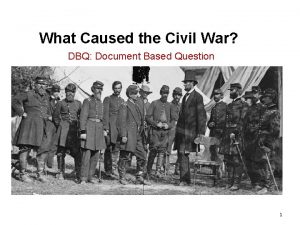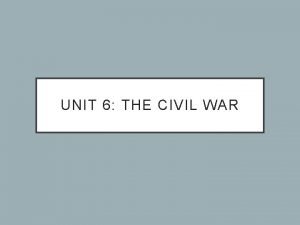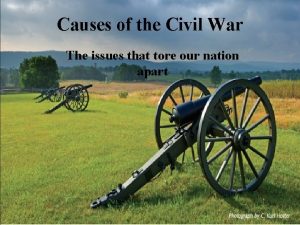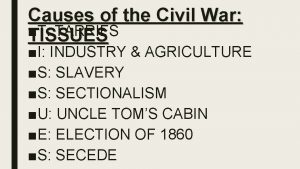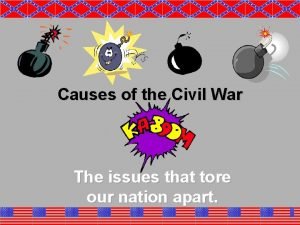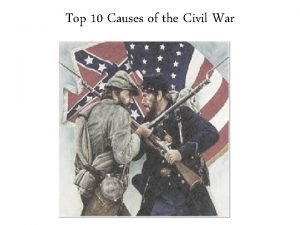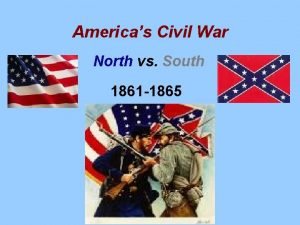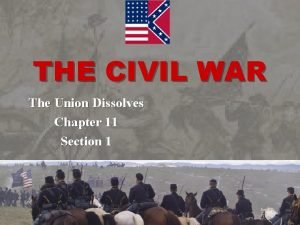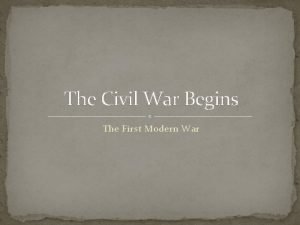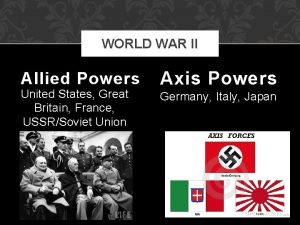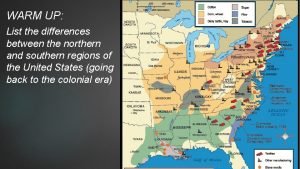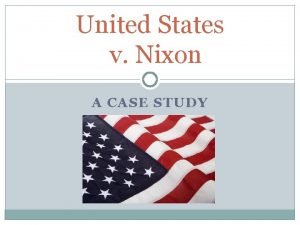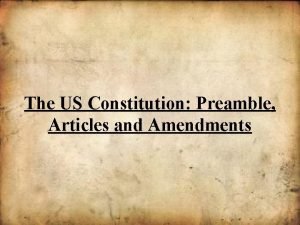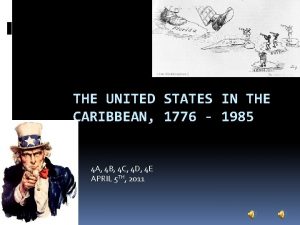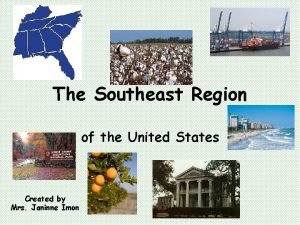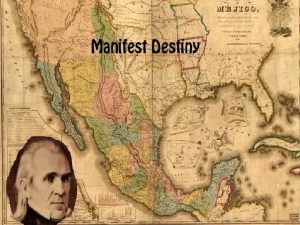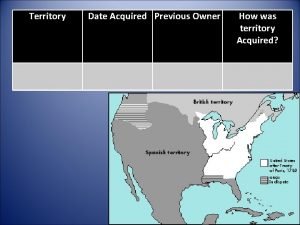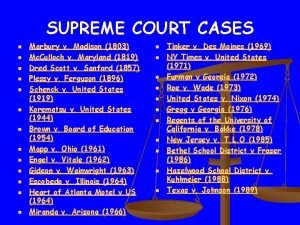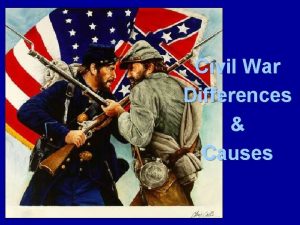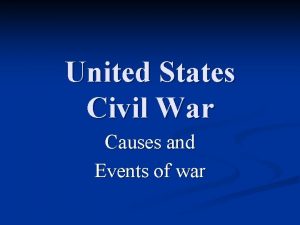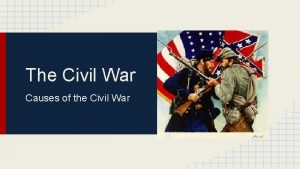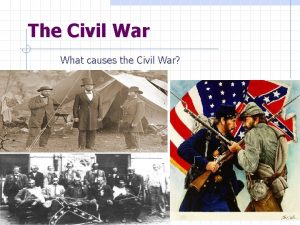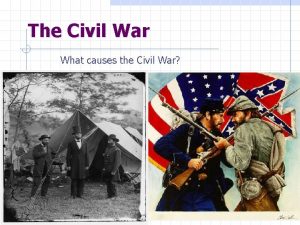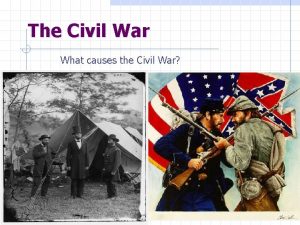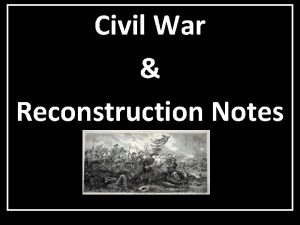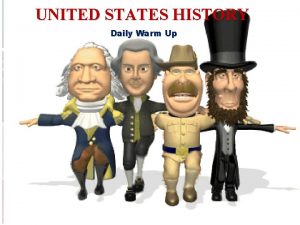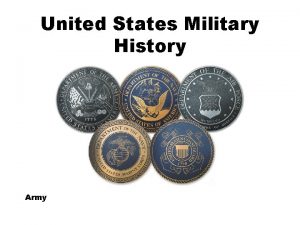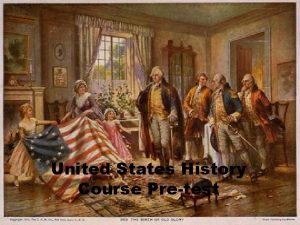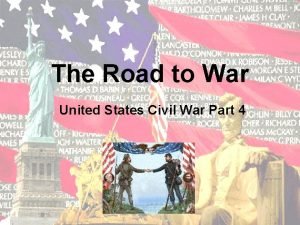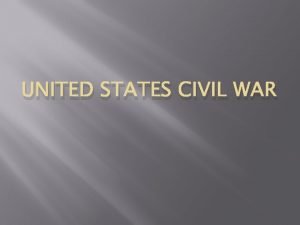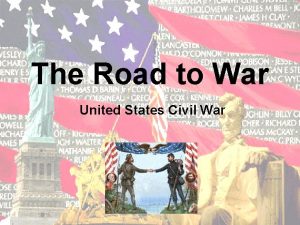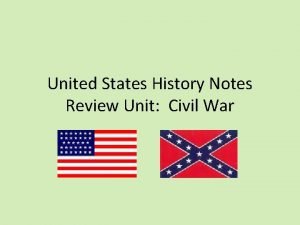Causes of the Civil War United States History





























- Slides: 29

Causes of the Civil War United States History Mrs. O’Shea

North n The North had a more diverse economy n Industry flourished n Openly opposed slavery in the South and the new territories n More urbanized than South n More populated (more representation in federal government)

South n Rural plantation economy n Relied on slave labor n Southerners feared loss of slavery would ruin their economy

Manifest Destiny n Manifest Destiny – U. S had a divine mission to spread throughout the continent SPREAD IDEAS OF SELF -GOVERNMENT AND LIBERTY

Texas War of Independence n n n Mexico had encouraged settlement of Americans into Texas Too many settlers came. Mexico prohibited more settlers and outlawed importation of slaves. 1835 – Fighting broke out 1836 – Battle of the Alamo May 14, 1836 – Treaty declares Texas independent


Mexican American War n 1836 – Texas votes to be annexed by United States n Mexican leader – Santa Anna warned annexation would be considered “act of war” n April 1844 – U. S. signs treaty of annexation with Texas

• Mexico and US disagree on southern border • November 1845 – US offers to buy New Mexico and Texas for 30 million • March 1846 – Polk sent troops into disputed area • Late April 1846 – small skirmish between forces • Polk uses this as excuse to declare war – “American blood shed on American soil” • May 1846 – US declares war on Mexico

Treaty of Hidalgo -Mexico gave up claims to Texas and disputed territory between Texas and Mexico -Mexico gave up New Mexico and California -US pays Mexico 15 million

How History Changes n 1849 n 1880 n 1911 n 1966 n 1995 n Our textbook:

How History Changes n n n 1849 – Mexicans stated war – US has to defend Texas 1880 – Racial conflict – inevitable conflict -superior race 1911 – Preemptive strike – Mexicans are coming 1966 – Abraham Lincoln questions war – there is opposition 1995 – Polk knew troops in disputed area would start war – we would win Our textbook:

P. 355 -364 Describe the following in detail. Be ready to discuss/present ideas from group to class. Effects of Missouri Compromise of 1850 Kansas-Nebraska Act Effects of Kansas-Nebraska Act (bleeding Kansas)

Review of Representation in the Federal Government Senate = 2 each House of Representatives = based on population

Missouri Compromise 11 11 slave states free states Purpose: To compromise on the admittance of Missouri as a state 1) Missouri = slave state Maine = free state 2) North of 36° 30’N in Louisiana Purchase = free territory


What to do about California? n n California wanted to be admitted as a free state This would upset the balance between “free” and “slave” states

Compromise of 1850 1. 2. 3. California is admitted as a free state New Mexico and Utah territories use popular sovereignty Stricter Fugitive Slave Act enforced


Popular Sovereignty n Policy of letting the people in a territory decide whether slavery would be allowed there n Problems with popular sovereignty: n n n When is vote taken? How many people should live in the area? Can the decision ever be changed?

Kansas-Nebraska Act n n Developed by Illinois Senator Stephen Douglas – driven by political aspirations Forced the repeal of the Missouri Compromise in 1854 1) Kansas Territory (south of the 40 th parallel) and the Nebraska Territory (north of the 40 th parallel). 2) POPULAR SOVEREIGNTY

Bleeding Kansas n Supporters and opponents attempted to populate Kansas to win the vote over slavery n Violence erupted – Bleeding Kansas is the legacy

Beating of Charles Sumner

UNCLE TOM’S CABIN • In 1852, Harriet Beecher Stowe published her influential novel, Uncle Tom’s Cabin • The book stressed the moral evil of slavery • Abolitionist protests increased Instant best seller sold 500, 000 by 1857 Author Harriet Beecher Stowe

Dred Scott Decision Background: The year is 1857. An enslaved man from Missouri is under the ownership of a doctor who brings the man with him to the North. He has spent many years with his owner in “free” states and territories. The entire time that the man was in the North, he served his owner, who believed that the man was his property. The doctor returned to Missouri with his slave once he had completed his work in the North. The owner is now dead, leaving behind a wife. The slave is suing for his freedom.

The slave’s argument: Since his owner chose to bring him to the North, where the institution of slavery is illegal, the owner has forfeited his right to enslave the man. Defense’s argument: The slave is considered the doctor’s property, and the Constitution is supposed to protect the rights of citizens (including the right to move anywhere and bring their possessions with them). Property cannot be stripped of a citizen without due process of the law.

Dred Scott Decision n Slaves = not citizens and could not sue n Enslaved people could not win freedom just by living in free territory or state n Missouri Compromise = unconstitutional (Congress could not deprive people of property)

Lincoln-Douglas Debates n 1858 race for U. S. Senate in Illinois n Slavery in the territories n Republican Lincoln = no more spreading of slavery n Democratic Douglas = popular sovereignty

• “A house divided against itself cannot stand. I believe this government cannot endure permanently half slave and half free. I do not expect the Union to be dissolved -- I do not expect the house to fall -- but I do expect it will cease to be divided. It will become all one thing, or all the other. ” 1858 – Old Capitol Building Springfield – Abraham Lincoln

REVIEW MOVIE Causes of the Civil War
 What caused the civil war dbq
What caused the civil war dbq Reasons for civil war
Reasons for civil war Causes of the civil war jeopardy
Causes of the civil war jeopardy What were the 4 main causes of the civil war
What were the 4 main causes of the civil war Tissues causes of civil war
Tissues causes of civil war What are the 3 main causes of the civil war
What are the 3 main causes of the civil war Causes of the civil war
Causes of the civil war Glorious revolution causes
Glorious revolution causes North and south states civil war
North and south states civil war North and south states civil war
North and south states civil war Southern states civil war
Southern states civil war Civil war first modern war
Civil war first modern war Chapter 16 lesson 2 challenges to slavery
Chapter 16 lesson 2 challenges to slavery Us history regents essay
Us history regents essay Civil rights webquest
Civil rights webquest Was the united states on the axis powers or allied powers?
Was the united states on the axis powers or allied powers? Unit 2: the united states and canada worksheet answers
Unit 2: the united states and canada worksheet answers 36 30 line
36 30 line Pro soccer us
Pro soccer us Marshall case
Marshall case United states student association
United states student association The united states ought to provide a universal basic income
The united states ought to provide a universal basic income Article i of the constitution
Article i of the constitution The united states in the caribbean 1776-1985
The united states in the caribbean 1776-1985 Products of the southeast
Products of the southeast Expansion of the united states of america 1607 to 1853 map
Expansion of the united states of america 1607 to 1853 map When did nicholas novikov write the telegram
When did nicholas novikov write the telegram Who was the previous owner of the oregon country
Who was the previous owner of the oregon country Awake united states author
Awake united states author Heart of atlanta motel v. united states
Heart of atlanta motel v. united states
